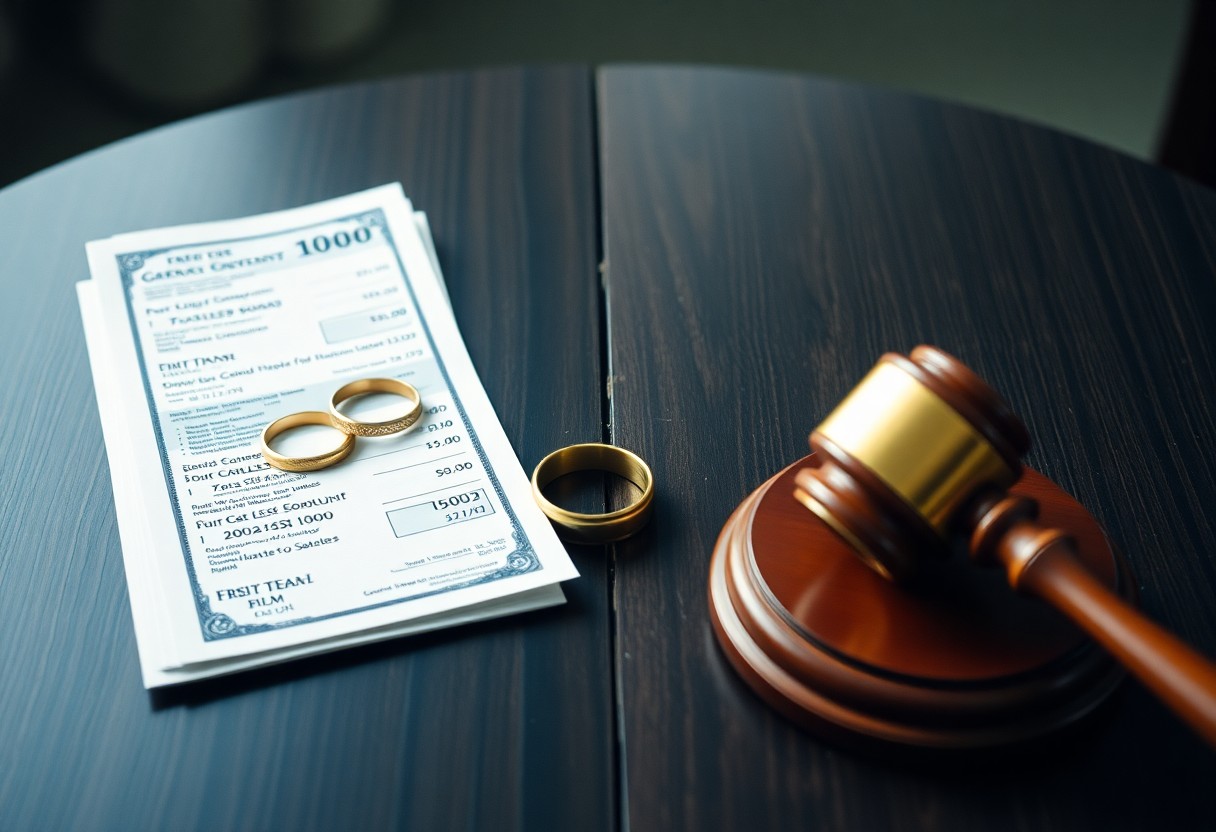Just when you think you’ve navigated the complexities of divorce, joint bank accounts can present significant challenges. You may face the risk of losing access to funds if not addressed properly. It’s important to understand that after your separation, these accounts can be frozen or liquidated to equitably divide assets. Knowing how to protect your finances and secure your interests is vital. Additionally, if you choose to keep the account, you must handle its transition thoughtfully to avoid any potential disputes down the line.

Key Takeaways:
- Joint bank accounts can be affected by divorce proceedings; it’s important to address them during the legal process.
- Both parties may need to disclose account information to ensure fair distribution of assets.
- Closing joint accounts may be a necessary step to prevent unauthorized withdrawals post-separation.
- Debts associated with joint accounts may also be considered in the division of assets during divorce.
- In some states, the funds in joint accounts may be classified as marital property, impacting division strategies.
- Communication between both parties can facilitate a smoother transition when managing joint accounts during divorce.
- Consulting with a legal expert or financial advisor can provide guidance on best practices for handling joint accounts in a divorce.
Understanding Joint Bank Accounts
A joint bank account is a shared financial account that two or more individuals maintain together, typically used for managing household expenses or savings. These accounts can foster collaboration in financial management and ensure that both parties have access to funds for shared goals.
Definition and Purpose
Purpose of a joint bank account is to simplify daily financial transactions between account holders. It allows for pooling of resources, making it easy to manage shared bills, contribute to joint savings, or cover household expenses without the need for constant reimbursement.
Overview of Joint Ownership
Accounts that are jointly owned are held under the names of multiple individuals, allowing for equal access and control over the funds. The key aspect of joint ownership is that both parties have the same rights to deposit and withdraw money. It is important to note that all account holders are liable for any fees or overdrafts, which can lead to potential financial risk. In the event of a dispute or divorce, understanding how these accounts function can significantly impact your financial situation.
Legal Implications of Divorce
While navigating the process of divorce, it’s important to understand the legal implications surrounding your joint bank accounts. The division of assets, including shared financial accounts, can significantly impact your financial future. You should be aware of how the law treats these accounts and the potential consequences for your financial stability during and after the divorce proceedings.
Asset Division Laws
On the topic of asset division, laws vary between states, with some following community property rules while others adhere to equitable distribution. If you and your spouse acquire funds in a joint account during the marriage, these funds are often considered marital property and will likely be divided during divorce proceedings.
State Variations on Joint Accounts
Besides understanding general asset division laws, it’s important to recognize that state laws can greatly influence how joint accounts are treated after divorce.
In fact, certain states may view joint accounts differently based on factors such as the source of deposits or the intention behind the account. In community property states, for example, all assets acquired during the marriage—including joint bank accounts—are generally split 50/50. Conversely, in equitable distribution states, division may not be equal but rather fair based on multiple factors, including income, debt, and length of marriage. Because of these distinctions, it’s vital to consult with a legal expert for personalized advice based on your specific circumstances and state laws.

Steps to Take Upon Divorce Filing
Despite the emotional turmoil of filing for divorce, it’s important to take immediate action regarding your joint bank accounts. Consider How to Handle Joint Accounts During a Divorce to protect yourself financially and ensure that both parties’ interests are safeguarded during the division of assets.
Communication with Your Ex-Spouse
One of the first steps you should take is to have an open, honest conversation with your ex-spouse about your joint bank accounts. Clear communication can help avoid misunderstandings and facilitate a smoother transition as you both navigate your financial responsibilities post-divorce.
Freezing the Joint Account
Divorce can complicate finances significantly, making it vital to consider freezing your joint account. This action prevents either party from withdrawing or accessing funds without mutual consent, safeguarding your share of the assets during legal proceedings.
It’s important to move quickly and communicate with your bank to initiate the freezing process. Make sure to document all correspondence and decisions regarding the account. This step can protect you from any potential financial abuse or unwanted transactions, ensuring that both you and your ex-spouse abide by the agreed-upon arrangements while settling your financial matters. Without taking these measures, you may face serious consequences, including unintended financial loss during a sensitive time.

Dividing Joint Funds
Many factors come into play when dividing joint funds after a divorce. It’s important to have a clear understanding of all accounts and their balances to ensure a fair distribution. Both parties should openly discuss their financial situations and work together to reach an amicable agreement. This process can be complicated, but being transparent can significantly improve the outcome for both you and your ex-spouse.
Inventory of Joint Assets
After the decision to divorce, make a comprehensive inventory of all joint assets, including bank accounts, investments, and shared property. This detailed list serves as a foundation for negotiations and helps you both understand what you have in common. Having a clear visual can facilitate discussions and promote fair decision-making throughout the division process.
Equitable Distribution vs. Equal Division
Division of joint funds can follow two main approaches: equitable distribution or equal division. While equal division suggests splitting everything 50/50, equitable distribution takes into account various factors, such as financial need or contributions made during the marriage. Understanding these differences can guide you in determining the best approach for your situation.
Equitable distribution means dividing assets based on fairness rather than a strict 50/50 split. Courts often consider factors such as the length of your marriage, the financial situation of each party, and any sacrifices made during the relationship. This approach can lead to a more balanced outcome, especially if one spouse was a primary caregiver or sacrificed their career for the other’s benefit. It’s important to be aware that while equal division is straightforward, equitable distribution may offer a more tailored and beneficial result for both parties involved.
Protecting Individual Finances
For those navigating the complexities of a divorce, safeguarding your individual finances is important. You should take immediate action to separate your financial interests and ensure that your financial future remains secure. This includes understanding how to handle your joint accounts while transitioning to a new financial situation.
Opening New Accounts
An important step in protecting your finances is to open new individual bank accounts. This allows you to manage your funds independently and avoid any potential disputes over joint assets during the divorce process. By establishing your own accounts, you maintain control over your finances and can start rebuilding your financial identity.
Separating Joint Obligations
Individual obligations related to joint accounts must be clearly separated during a divorce to prevent future complications.
At the onset of the divorce process, it is vital to identify and document all joint debts and obligations such as credit cards or loans. Reach out to creditors to notify them of your situation and discuss how to distribute responsibilities fairly. This can help you mitigate any negative impacts on your credit score. Ensure that all accounts are either paid off or transitioned into individual names to avoid your ex-partner incurring debt on your behalf, which can lead to financial repercussions down the line.
Seeking Professional Guidance
To navigate the complexities of joint bank accounts after a divorce, it is wise to seek professional guidance. Engaging with financial and legal experts can help you understand your options and the best course of action to protect your interests. With their support, you can manage this process effectively and ensure that financial matters are resolved fairly.
Role of Financial Advisors
By consulting a financial advisor, you can gain valuable insights into how to manage your finances post-divorce. They can assist in evaluating your current financial situation, providing strategies for asset division, and helping to create a sustainable budget for your future.
Importance of Legal Counsel
For a smooth transition through the divorce process, engaging a legal professional is necessary. They will guide you through the legalities surrounding your joint accounts and ensure your rights are protected during negotiations.
Plus, a legal expert can help you understand property division laws in your state, ensuring that your share of assets is fairly assessed. They can also warn you about potential financial pitfalls during the divorce process, such as hidden debts or misreported financial records. Having competent legal counsel will empower you to make informed decisions, ultimately leading to a more favorable financial outcome as you transition into the next chapter of your life.
To wrap up
With this in mind, navigating joint bank accounts after divorce can be complex. You need to ensure that both parties understand their rights and responsibilities regarding shared funds. It’s necessary to communicate openly with your ex-spouse and consult with a legal professional to safeguard your financial interests. If you’re wondering about the implications for access to your accounts, you can find more information in this article on After divorce, can a former spouse have access to your bank account.
FAQ
Q: What happens to joint bank accounts when a couple files for divorce?
A: When a couple files for divorce, joint bank accounts typically remain open but may be subject to changes. Both parties may have the right to withdraw funds until the divorce is finalized. However, it’s necessary to communicate and agree on how to handle the account during the divorce process to avoid potential disputes.
Q: Can one spouse withdraw all the money from a joint account after divorce proceedings have started?
A: While technically possible, it is not advisable for one spouse to withdraw all the funds from a joint account after divorce proceedings have begun. Such actions may be viewed as financial misconduct and could negatively impact the divorce settlement. It’s best to consult with a legal professional for guidance on how to handle joint financial assets.
Q: Should we close our joint bank accounts immediately after deciding to divorce?
A: Closing joint bank accounts immediately after deciding to divorce might not be the best option. Each spouse may need access to funds for living expenses and legal fees during the divorce process. Instead, consider negotiating an agreement about how to manage the account and any contributions until the divorce is finalized.
Q: How are joint funds divided during a divorce?
A: Joint funds are generally divided based on state laws regarding marital property. This division process may involve assessing the total balance of the joint accounts, evaluating both spouses’ contributions, and considering any other financial assets. A mediator or court may help facilitate a fair division.
Q: What if one spouse refuses to cooperate regarding joint accounts during a divorce?
A: If one spouse refuses to cooperate regarding joint accounts, the other may need to seek legal assistance to address the issue. A lawyer can help navigate the division of assets as specified in the divorce agreement and may even petition the court for assistance if necessary.
Q: Are funds in a joint bank account considered marital property?
A: Yes, funds in a joint bank account are generally considered marital property, meaning that they are subject to division during a divorce. Exceptions may exist, such as if one spouse can prove that certain funds originated from a separate property or inheritance that is not subject to division.
Q: Can either spouse open new bank accounts during the divorce process?
A: Yes, either spouse can open new bank accounts during the divorce process. However, it is advisable to disclose any new accounts to avoid perceptions of hiding assets. Establishing separate accounts can help in managing personal finances going forward but should be done transparently.
